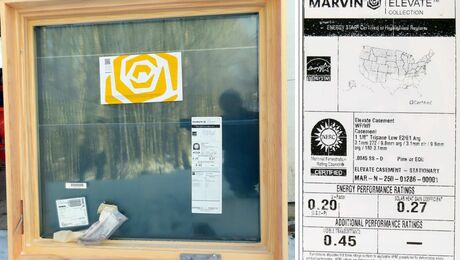About dense-packed cellulose
I am now shopping some insulation options for my brick home…still unresolved. I ran across a blurb at a local contractor’s web site and was curious about this proclamation:
“Cellulose insulation is made from recycled newspaper. It contains borax, boric acid and aluminum sulfate. Because cellulose is an organic material, it decomposes as it ages. Eventually it leaves behind a fine dust or powder, which will cause extreme settlement inside wall cavities. Organic fibers will readily absorb large amounts of moisture, emitting fire retardant chemicals while drying, which can promote the growth of mold in walls and attic areas. Because the chemicals in cellulose are corrosive, they can adversely affect older homes containing knob and tube wiring.”
Is there any truth to this?
susan
GBA Detail Library
A collection of one thousand construction details organized by climate and house part









Replies
borax is both a fire retardant and anti-fungal component in cellulose insulation. it's also an anti-corrosive.
borax is benign and non-toxic - it's used as a food preservative in some countries.
it's also used in fiberglass insulation (and is largest source of borax usage worldwide, i believe)
i think the contractor is confusing wood cellulose fibers with cellulose insulation. i'm guessing he's an SPF kind of guy?
cellulose can settle; experienced installers can keep this from happening. the best way to think of this is when you get a package of cereal or bag of chips and you open it and it appears 3/4 full, because it settled after they filled it.
cellulose contains borates which by far are the freiendliest fire retardtents and preservatives and certain pest repellent . it basically is a salt and you could eat it; i've tried it myself. most other insulation contains other toxic chemicals to achieve the same affect like bromates.
celluose, like other home products does absorb moisture which is not a bad thing is most cases as it can act as a buffer, releasing the mositure when the home gets dry. it is only an issue when poorly installed; the same would go for the wood studs between it too.
My take on the summary of cellulose from the contractor is that they just don't like it and may prefer other options. I will opt for dense-pack cellulose in the end and will find an installer who ...believes... in it.
susan
Based on his logic they any newspaper should turn to dust, books too for that matter. Dense pack cellulose will not settle. Think of rolling up a sleeping bag and stuffing it in a knapsack. IT will sit on a shelf for years and does not deflate to nothing. The sleeping bag has been compressed and is pushing out till released. The same thing is happening with dense pack insulation.
Borate is a very safe mineral with the toxicityty of table salt. IF you are old enough you may have seen the 20 Mule Team Borax commercials. Borax is a detergent made from borate.
Cellulose has been proven to be noncorrosivesive. I believe you can find the information on the CIMA website.
Knob and tube wiring should not be covered with insulation, cellulose or other. Any statement of insulation and knob and tube is not applicable.
In reading Building Science publications they state that dense pack comes close to being an air barrier for existing homes.
There have already been four good answers, so I don't need to repeat them. I would just like to add that cellulose insulation as we know it today has been around since the 1920s. The oldest company in the cellulose industry has been in business since 1949. Does anyone think this would be true if all the bad things competitors claim about cellulose were true?